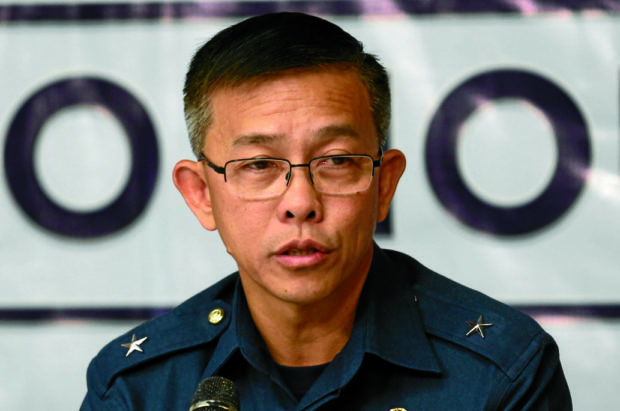AFP supports 1-year extension of martial law

AFP Spokesperson Brigadier General Restituto Padilla
INQUIRER FILE
PHOTO/JOAN BONDOC
Citing the attempts at reconsolidation by the extremists who survived the Marawi siege and the “increasing violence” from communist insurgents, among other threats, the Armed Forces of the Philippines on Friday said it was endorsing the plan to extend martial law in Mindanao.
Maj. Gen. Restituto Padilla, AFP spokesperson, said the military had submitted to President Rodrigo Duterte its recommendation supporting the Philippine National Police proposal to extend martial law in Mindanao.
Though Padilla claimed to be unaware of the length of the military’s recommended extension, some senators belonging to the majority bloc on Friday said they understood the proposal called for a one-year extension.
The martial law proclamation over Mindanao is set to expire on Dec. 31, unless extended by Congress, which is scheduled to go on a monthlong break from Dec. 15.
There have been calls from several sectors to keep martial law in place, but the minority bloc in the Senate is pushing for its termination to hasten the return of displaced Marawi residents to their homes.
Article continues after this advertisementSeveral senators said they would decide whether to support the extension only after getting a security briefing from the AFP and the PNP.
Article continues after this advertisementSenate President Aquilino Pimentel III said senators would discuss the police and military recommendations early next week, immediately after receiving a formal request from Malacañang.
“I expect the formal letter request for extension to be given to the Senate on Monday, then I will immediately take this up with my colleagues,” Pimentel told reporters in a text message.
The President declared martial law in Mindanao on May 23 after Islamic State sympathizers laid siege to Marawi City. He won congressional approval on July 22 for the first extension of martial rule.
Mr. Duterte declared the city’s liberation from the Maute and Abu Sayyaf group extremists five months later.
While saying he was not privy to the AFP report, Padilla said Mindanao was still facing threats from the Daulah Islamiyah to which the Maute, Abu Sayyaf and other terrorist organizations belong.
Dangling cash offers, remaining members of these groups are now trying to recruit more fighters from among women and children, as well as the relatives of those who were killed in Marawi, he said.
“Their recruitment is part of their efforts to regain their strength, and they may be expecting that they could retaliate, which is why they remain threats to security, especially in Marawi,” Padilla said.
“This is something that we don’t want to happen, for this group to come back again with a vengeance,” he added.
There could also be violence from the Bangsamoro Islamic Freedom Fighters in Maguindanao, Lanao and Cotabato, as well as from the Abu Sayyaf terrorists in Basilan, Sulu and Tawi-Tawi, he said.
Padilla said the communist rebels needed to be watched as well, after Mr. Duterte ended peace talks with the National Democratic Front of the Philippines (NDFP) and declared the Communist Party of the Philippines and its armed wing, New People’s Army (NPA), as terrorist organizations.
‘Acts of violence’
“That’s part of the reason why martial law may be needed to cover other areas where potential terrorists are in hiding,” he added.
Padilla noted that from January to Nov. 30, there had been a 65-percent increase in violent incidents perpetrated by the NPA in Eastern and Western Mindanao.
Estimated damage from these attacks was at P2.4 billion, he said.
“These acts of violence and destruction from the ranks of the NPA are something that we are seriously looking at because these affect our economy,” Padilla said.
Sen. Miguel Zubiri, whose hometown is in Bukidnon, said he was open to the proposal to extend martial law in the region, though he still needed to hear what security officials have to say before he could vote on it.
Sen. Francis Escudero said he had not seen the request and the justification for extension. “But should it be given to us, I will ask that Malacañang and security officials brief the Senate, even in executive session, as to the reasons for such an extension before I decide,” he said.
A briefing with the PNP and the Department of National Defense is “badly needed” so that lawmakers can be apprised of the developments in Marawi, according to Sen. Joel Villanueva.
Sen. Grace Poe agreed with her colleagues but said that senators should also listen to feedback from local government units in Mindanao before making their decision.
Sen. Gringo Honasan, a retired Army colonel, said he would endorse the extension of martial law, pointing out that the recommendation came from the PNP and the Department of the Interior and Local Government, two key agencies which he said were active on the ground.
“If and when the President asks for it from Congress, everything is procedural by law. Better for us to have [martial law extension] when we need it than to need it and not have it, expeditiously,” Honasan said.
But minority senators objected vehemently to an extension, saying it was not constitutional and that because of it, many residents of Marawi still did not want to return to their homes.
Senate minority leader Frank Drilon said a second extension of martial law in Mindanao would be “patently unconstitutional.”
In a statement on Friday, the minority bloc said they “support the position of Mindanaoans for no martial law extension in their home island.
“As security forces reign supreme during martial law, would not military rule actually get in the way of a people-centered rebuilding and rehabilitating of the once-vibrant city? What is the need for martial law? Would martial law suspend bidding in the reconstruction of the city?”
The bloc also wanted to know about the role of Marawi residents in the planning and rehabilitation of their city.
“What guarantees do they have that they can return to their old location and start life anew?” the senators asked.